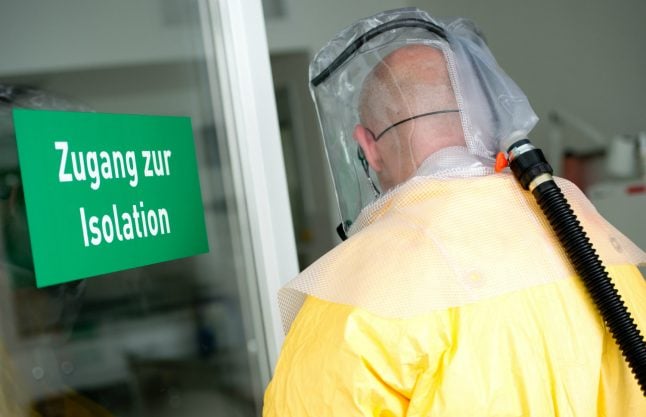Other confirmed cases in Europe of the viral outbreak have so far involved patients who had recently been to China.
In this instance, the 33-year-old German attended a training session held by a visiting Chinese colleague on January 21 at the office of car parts supplier Webasto in Stockdorf, in Germany's southern Bavaria region.
The Chinese woman “started to feel sick on the flight home on January 23”, said Andreas Zapf, head of the Bavarian State Office for Health and Food Safety.
The German man tested positive for the virus on Monday evening after reporting flu-like symptoms.
The virus, which can cause a pneumonia-like acute respiratory infection, has in a matter of weeks killed more than 100 people and infected some 2,740 in China, while cases have been identified in more than a dozen other countries.
READ ALSO: Coronavirus in Germany: What you need to know
He remains in hospital in an isolation ward, but Zapf said he “was doing well”.
A spokeswoman for the Robert Koch Institute, Germany's centre for disease prevention and control, told AFP the German case appeared to be the first instance of a “human-to-human transmission” outside Asia.
Vietnam and Japan have also each reported a patient testing positive for the new coronavirus without having travelled to China.
The Chinese woman working for Webasto immediately sought medical attention on her return to China.
She was confirmed to have caught the virus, which has spread rapidly in recent weeks after first emerging in the Chinese city of Wuhan.
The woman had recently visited her parents in the Wuhan region, Zapf said.
In a statement, the Webasto company said it had halted all business travel to and from China “for at least the next two weeks”.
Health officials are checking some 40 people that the two infected workers have been in contact with recently, including colleagues and family members.
The virus has so far killed 106 people and infected over 4,000 – the bulk of them in and around Wuhan.
Cases have also been reported in a string of other countries, including the United States, France, Australia and Japan.
READ ALSO: 'We have to expect cases': Germany ramps up preparations for coronavirus
Health Minister Jens Spahn tweeted to say that it was “expected” that the virus would reach Germany, and the case in Bavaria showed Germany was “well prepared”.
Es war zu erwarten, dass das #Coronavirus auch Deutschland erreicht. Der Fall aus #Bayern zeigt aber, dass wir gut vorbereitet sind. Der Patient wurde isoliert und wird behandelt. 1/3
— Jens Spahn (@jensspahn) January 28, 2020
In another tweet Spahn added that the risk of virus spreading throughout the population in Germany remained low, according to health experts.
Germany has recommended its citizens avoid “unnecessary” trips to China as the virus spreads.
The country is also considering the possible evacuation of its nationals from the Chinese city of Wuhan, the epicentre of the virus.
'Ramped up'
As The Local has reported, health officials in Germany have been preparing for the arrival of the deadly virus.
At the weekend Berlin started an awareness campaign at the airports Tegel and Schönefeld.
Airport employees have hung up posters with information about the coronavirus and distributed flyers to arriving and departing passengers.
France was the first European country to be affected by the outbreak, which has reported three known cases of the virus.
All three had recently travelled to China and have been placed in isolation.



 Please whitelist us to continue reading.
Please whitelist us to continue reading.
Member comments